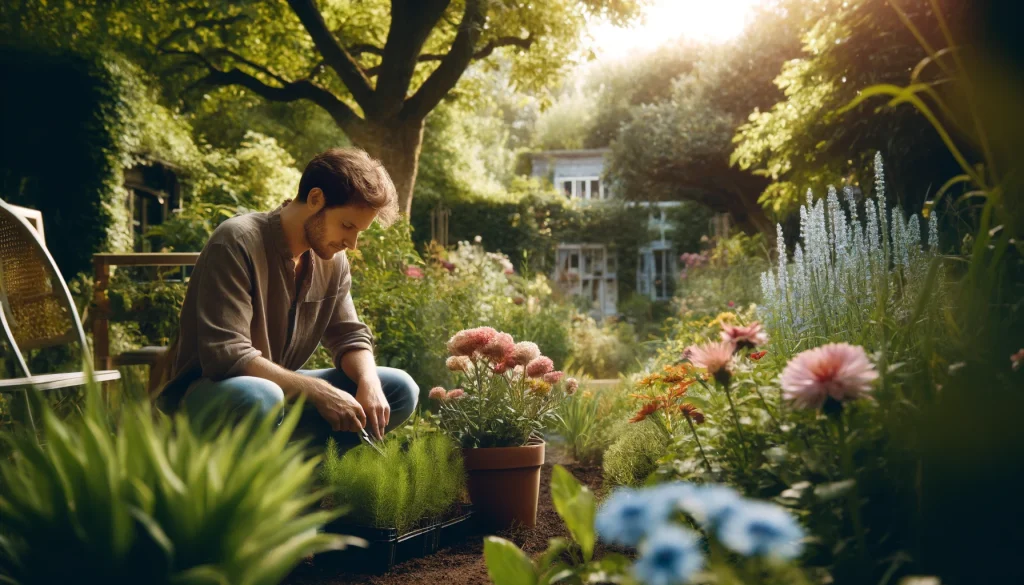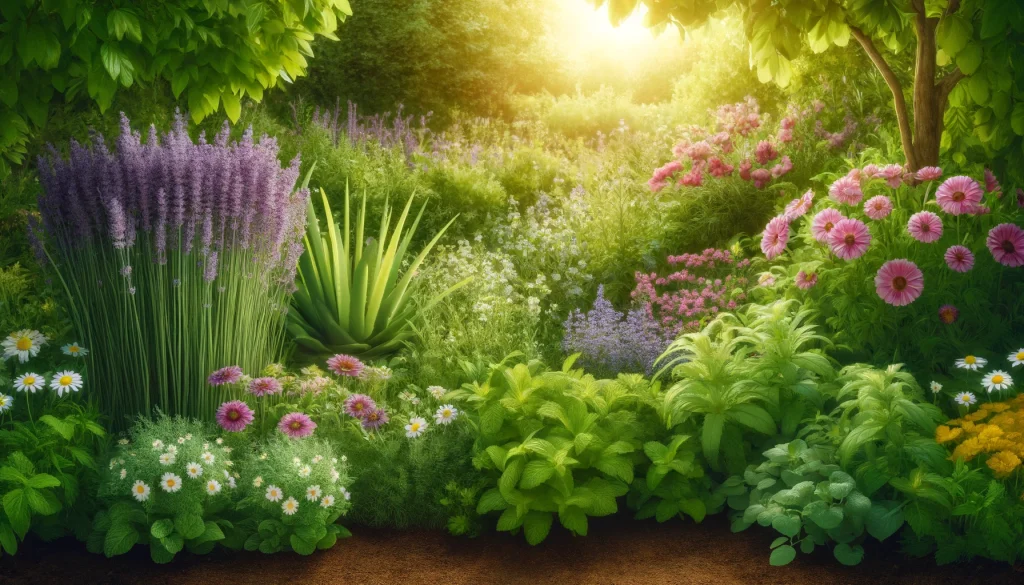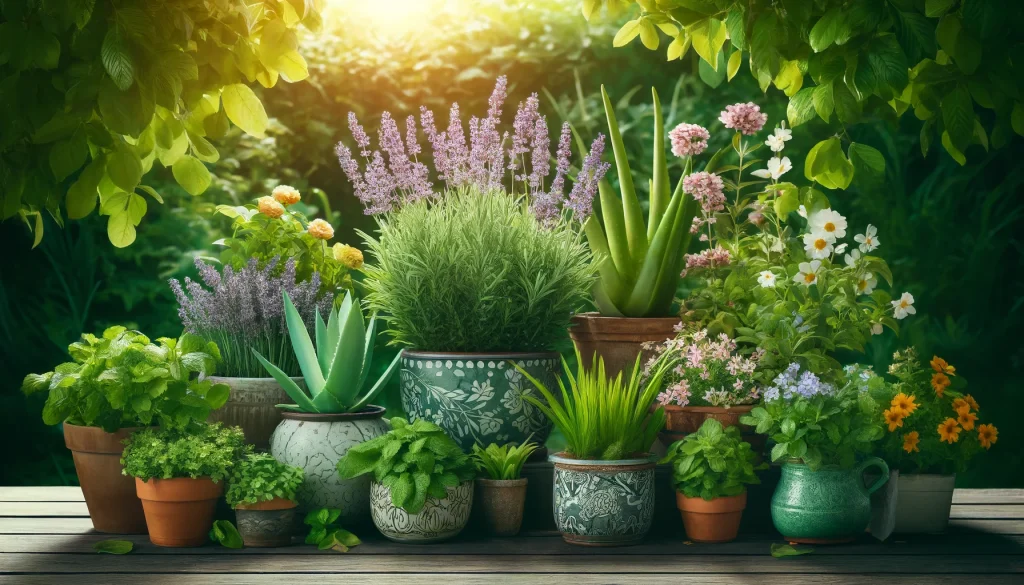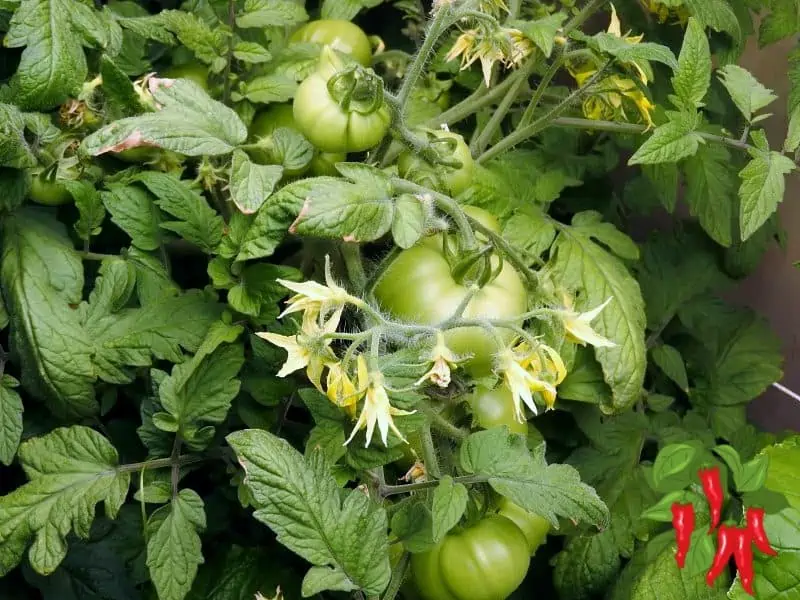This post may contain affiliate links. If you buy something from one of our links we may earn a commission. Thanks

Howdy, everyone! Gardening for stress relief is more than just a trend. It’s a soothing escape from the hustle and bustle of everyday life.
Dive into the dirt, tend to your plants, and watch your worries melt away as you cultivate your own peaceful oasis.
Gardening for Stress Relief Key Takeaways
- Gardening for stress relief is an effective way to reduce anxiety and improve mood.
- Engaging with nature, tending plants, and enjoying the outdoors can significantly lower stress levels and promote relaxation.
Introduction Gardening for Stress Relief
Gardening for stress relief is a wonderful way to unwind and find peace amidst our busy lives.
Tending to plants and digging in the dirt can help you feel more relaxed and centered.
Let’s explore some specific benefits and how certain plants like lavender, aloe vera, chamomile, jasmine, and peppermint can enhance your gardening experience.
Benefits of Gardening for Stress Relief
- Physical Activity: Gardening involves various movements that provide a good workout, improving your overall fitness and releasing endorphins.
- Mental Well-Being: The act of nurturing plants can boost your mood, reduce anxiety, and increase feelings of happiness.
- Mindfulness and Focus: Engaging in gardening tasks helps you stay present, providing a break from daily worries.
Plants that Promote Stress Relief
- Lavender: Known for its calming scent, lavender can help reduce anxiety and improve sleep quality.
- Aloe Vera: This plant not only soothes the skin but also adds a touch of greenery to your space, promoting a relaxing atmosphere.
- Chamomile: Often used in teas for its calming effects, chamomile in your garden can provide a sense of peace.
- Jasmine: Its sweet fragrance can improve mood and reduce stress levels.
- Peppermint: The refreshing scent of peppermint can invigorate the mind and body, helping to relieve tension.
Gardening offers a simple yet effective way to improve your well-being. Dive into the world of plants and discover how tending to a garden can bring tranquility to your life.
The Physical Benefits of Gardening

Gardening isn’t just about growing plants; it’s also a great way to keep your body active and healthy.
Let’s dive into how gardening activities can benefit your physical well-being.
Gardening as Exercise
Getting out in the garden is a fantastic way to get a full-body workout. Here’s how different gardening tasks can help you stay fit:
- Digging: Works out your arms, shoulders, and back. It’s like a natural weightlifting session!
- Planting: Involves bending and squatting, which strengthens your legs and improves flexibility.
- Weeding: Requires you to move around a lot, which boosts your cardiovascular health.

Spending time gardening can help you build strength, enhance flexibility, and get your heart pumping without even realizing you’re exercising.
Plus, being out in the fresh air makes it even more enjoyable.
Improving Diet
One of the best rewards of gardening is the fresh produce you get to enjoy. Here’s how growing your own vegetables and herbs can benefit your health:
- Fresh Vegetables: Homegrown veggies are packed with nutrients. Tomatoes, for example, are rich in vitamins C and K, while leafy greens like spinach provide iron and calcium.
- Herbs: Fresh herbs like basil and rosemary can add flavor to your meals without the need for extra salt or sugar. They’re also loaded with antioxidants.
When you grow your own food, you know exactly what’s going into your meals. It encourages you to eat more fruits and vegetables, leading to a healthier diet overall.
Plus, the satisfaction of eating something you’ve grown yourself can make your meals even more enjoyable.
Gardening provides a unique combination of physical activity and healthy eating, making it a wonderful hobby for anyone looking to improve their health and well-being. So grab your gardening gloves and start digging!
Mental Health Benefits of Gardening

Gardening isn’t just good for the body; it’s fantastic for the mind too. Let’s take a look at how digging in the dirt can boost your mental well-being.
Reduction of Stress and Anxiety
Gardening has been shown to lower cortisol levels, the hormone our bodies produce in response to stress.
Spending time in the garden helps you relax and unwind. The simple act of tending to plants can be incredibly calming, helping you to leave behind the worries of daily life.
When you focus on nurturing your garden, you’re giving your mind a much-needed break, which can significantly reduce feelings of stress and anxiety.
Improved Mood and Emotional Well-Being
Engaging in gardening activities can have a positive effect on your mood.
When you garden, your body releases serotonin and dopamine, the feel-good chemicals that enhance your mood and help combat depression.
These natural mood boosters make gardening a powerful tool for improving your emotional well-being.
There’s something incredibly satisfying about seeing the fruits of your labor flourish, which can lead to an uplifted and happier state of mind.
Sense of Achievement
One of the most rewarding aspects of gardening is the sense of achievement it brings.
Watching your plants grow from tiny seeds into mature plants provides a deep sense of accomplishment.
This process can give you a purpose and a sense of responsibility, boosting your self-esteem and overall mental health.
Every sprout, bloom, and harvest is a reminder of your hard work and dedication, offering a continuous source of pride and joy.
Gardening offers a wealth of mental health benefits, making it a perfect hobby for anyone looking to improve their overall well-being.
So, next time you’re feeling stressed or down, try spending some time in the garden and see how it lifts your spirits.
Mindfulness and Mental Focus

Gardening isn’t just a physical activity; it’s a wonderful way to cultivate mindfulness and improve mental focus.
Here’s how spending time with your plants can help you stay present and reduce negative thoughts.
Mindful Gardening
Mindfulness is all about being present in the moment, and gardening is a perfect way to practice this.
When you’re gardening, you focus on the task at hand, whether it’s planting seeds, watering plants, or pulling weeds.
This helps keep your mind anchored in the present, rather than wandering off to stressful thoughts about the past or future.
- Stay Present: By paying attention to the sights, sounds, and smells of your garden, you can enter a state of mindfulness. Notice the feel of the soil, the smell of the flowers, and the sound of the birds. This sensory engagement can help you feel more grounded and calm.
- Reduce Negative Thoughts: Engaging in mindful gardening allows you to take a break from the constant stream of negative thoughts. When you’re focused on your plants, there’s less room for worries and anxieties to creep in.
Distraction from Negative Thoughts
Gardening requires a lot of attention and care, which makes it an excellent way to distract yourself from negative thoughts. Here’s how:
- Focus on Tasks: When you’re busy with gardening tasks like weeding, pruning, or planting, you’re giving your mind something positive to focus on. This helps break the cycle of ruminative thinking that can lead to stress and anxiety.
- Sense of Purpose: Having specific tasks to complete in the garden gives you a sense of purpose and direction. This can help you feel more in control and less overwhelmed by negative thoughts.
By incorporating gardening into your routine, you can enjoy the mental benefits of staying present and focused.
It’s a simple yet effective way to practice mindfulness and give your mind a break from the stresses of daily life.
So grab your gardening tools and spend some quality time with your plants—you might just find it’s the perfect way to clear your mind and lift your spirits.
Social and Emotional Benefits

Gardening isn’t just a solo activity; it can be a wonderful way to connect with others and strengthen your relationships.
Let’s explore how gardening can help reduce feelings of loneliness and improve relationship satisfaction.
Gardening Can Reduce Feelings of Loneliness
Gardening can be a fantastic way to build social connections and combat loneliness. Here are some ways it can help:
- Community Gardens: Participating in a community garden allows you to meet new people who share your interests. Working alongside others, sharing tips, and seeing each other’s progress can create a sense of belonging and community.
- Sharing Experiences: Whether you’re swapping gardening tips with neighbors or showing off your latest harvest to friends, gardening provides plenty of opportunities for social interaction. Sharing your gardening journey with others can create meaningful connections and foster a supportive network.
Being part of a gardening community or simply sharing your gardening experiences can help you feel more connected and less isolated.
Improvement in Relationship Satisfaction
Gardening can also be a shared activity that brings people closer together. Here’s how it can enhance your relationships:
- Bonding Activity: Gardening with family or friends is a great way to spend quality time together. Whether you’re planting flowers with your kids or maintaining a vegetable garden with your partner, the shared effort can strengthen your bonds.
- Teamwork and Collaboration: Working together on gardening projects encourages teamwork and cooperation. Planning, planting, and maintaining a garden requires communication and collaboration, which can improve relationship dynamics.
- Shared Achievements: Celebrating the fruits of your labor, like a successful harvest or a blooming flower bed, can be a shared joy. These accomplishments can create happy memories and deepen your emotional connections.
By making gardening a collaborative effort, you can enjoy the added benefit of enhancing your relationships and building stronger emotional bonds.
Gardening offers a unique blend of social and emotional benefits, making it a fulfilling activity that improves your well-being and connections with others.
So, gather your friends or family, and start planting—it’s a wonderful way to grow closer together.
The Therapeutic Potential of Gardening

Gardening isn’t just a hobby; it has profound therapeutic potential, especially for mental health. Let’s explore how horticultural therapy works and how it benefits specific groups.
Horticultural Therapy
Horticultural therapy uses gardening activities as a therapeutic tool to improve mental health and well-being. This practice has been shown to help with various mental health issues, including PTSD, depression, and anxiety.
- PTSD: Gardening can provide a safe and peaceful environment for individuals with PTSD. The repetitive tasks and connection with nature help reduce hyperarousal and anxiety.
- Depression: Engaging with plants and nurturing them can lift spirits and provide a sense of purpose, which is particularly beneficial for those suffering from depression.
- Anxiety: The calming effects of gardening, such as the rhythmic nature of planting and watering, can help reduce anxiety symptoms by promoting relaxation and mindfulness.
Horticultural therapy leverages the healing power of nature to support mental health recovery and emotional well-being.
Gardening for Special Populations

Gardening offers significant benefits for various special populations, enhancing their quality of life and promoting overall well-being.
The Elderly
For the elderly, gardening can be a gentle form of exercise that improves physical health and mobility. It also provides mental stimulation and can reduce feelings of isolation.
- Physical Health: Gardening activities like planting and weeding help maintain flexibility, strength, and coordination.
- Mental Stimulation: Planning and tending a garden keep the mind active, which can help prevent cognitive decline.
- Social Interaction: Participating in community gardens or gardening groups can foster social connections and combat loneliness.
Individuals with Disabilities
Gardening can be adapted to meet the needs of individuals with physical or cognitive disabilities, making it an inclusive and accessible activity.
- Adapted Tools and Techniques: Raised garden beds, lightweight tools, and ergonomic designs make gardening more accessible.
- Therapeutic Benefits: Engaging with plants can improve motor skills, enhance cognitive functions, and provide a sense of accomplishment.
Those Recovering from Trauma
For individuals recovering from trauma, gardening offers a peaceful and nurturing environment that can aid in the healing process.
- Safe Space: Gardens can provide a tranquil space for reflection and recovery.
- Sense of Control: Tending to plants allows individuals to regain a sense of control and responsibility.
- Emotional Healing: The act of nurturing living things can foster emotional resilience and recovery.
Gardening’s therapeutic potential is vast, offering significant benefits for mental health and well-being across various populations.
Whether through structured horticultural therapy or simply enjoying the garden, the positive impact on mental health is profound and accessible to all.
Plants and Herbs for Stress Relief
Gardening with specific plants and herbs can significantly enhance the stress-relieving benefits of your garden.
Here are some top choices to consider and how to incorporate them into your garden for maximum relaxation.
Lavender, Aloe Vera, Chamomile, Jasmine, Peppermint
These plants are well-known for their calming properties and can be a great addition to any stress-relief garden.
- Lavender: Known for its soothing scent, lavender can help reduce anxiety and promote better sleep. Plant lavender in sunny spots and use its flowers to make calming sachets or teas.
- Aloe Vera: Besides its skincare benefits, aloe vera adds a touch of greenery to your space. It’s easy to care for and can be kept indoors or outdoors. Use its gel for minor burns and skin irritations.
- Chamomile: Often used in teas, chamomile flowers can help reduce stress and aid sleep. Plant chamomile in a sunny spot and harvest the flowers to dry and brew calming teas.
- Jasmine: With its sweet fragrance, jasmine can improve mood and reduce stress. Grow jasmine near windows or in your garden to enjoy its scent, especially in the evenings.
- Peppermint: The refreshing scent of peppermint can invigorate your mind and body. It’s easy to grow in pots or garden beds and can be used to make teas or simply enjoyed for its aroma.
Additional Stress-Relieving Plants
Beyond the more common choices, there are other plants that can further enhance the calming atmosphere of your garden.
- Rosemary: This aromatic herb can improve concentration and lift your spirits. Plant it in a sunny spot and enjoy its scent while you garden or use it in cooking.
- Snake Plant: Known for its air-purifying qualities, the snake plant can create a cleaner, more relaxing environment indoors. It’s low maintenance and thrives in low light conditions.
- Basil: Besides being a culinary favorite, basil’s scent can help reduce stress and anxiety. Grow it in your garden or kitchen for easy access to fresh leaves.
- English Ivy: This plant can improve air quality and create a peaceful, green space. It’s great for hanging baskets or as a ground cover in shaded areas.
- Transvaal Daisy: Also known as Gerbera, these bright flowers can boost your mood with their cheerful colors. Plant them in sunny spots for vibrant, long-lasting blooms.
By incorporating these plants into your garden, you can create a sanctuary that not only beautifies your space but also provides a natural way to reduce stress and enhance your well-being.
Enjoy the calming benefits of these herbs and plants as you tend to your garden and find peace in the process.
Visit my Amazon Influencer Page for videos and gardening products Grow Your Own Garden






